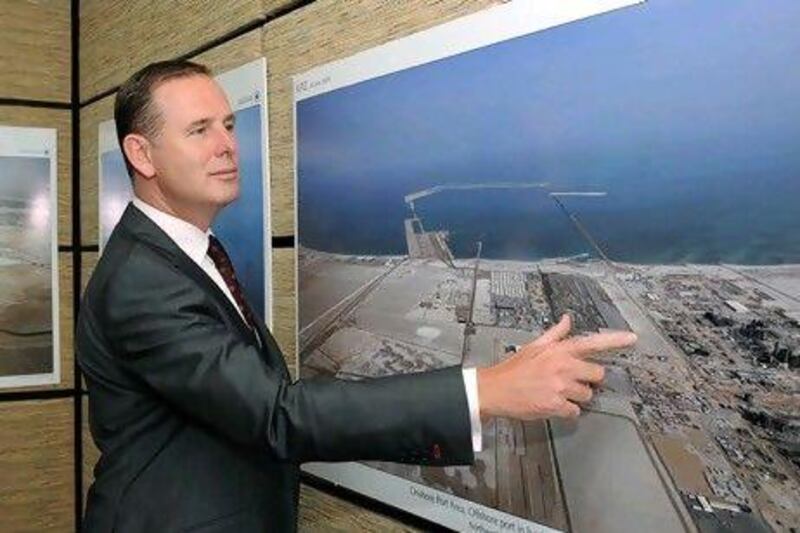With his foot on the accelerator, Tony Douglas speeds across the huge manufacturing hub known as Khalifa Industrial Zone Abu Dhabi (Kizad).
This is how Mr Douglas travels - in a black Nissan Patrol 4x4, the AC of which keeps the interior at 19°C.
"You simply cannot convey the sense of scale [of Kizad] until you do this [and drive alongside it]," says Mr Douglas, who is the chief executive of Abu Dhabi Ports Company and oversees Kizad's development.
"We're driving a little bit too quickly than we should," he adds.
Within the next two months, numerous manufacturers are set to announce they have leased land at Kizad, which sprawls across 417 square kilometres. That is equivalent to about two thirds the size of Singapore.
The zone is located almost equidistant from Dubai and Abu Dhabi island, and Mr Douglas is the man in charge of developing it, including a Dh26.5 billion (US$7.21bn) section, slated to open at the end of next year, for commercial shipping.
As ambitious as Kizad seems, it is not the first large-scale project Mr Douglas has worked on.
He is the former chief executive of Heathrow Airport, where he oversaw delivery of Terminal 5, a £4.3bn (Dh24.68bn) project heavily criticised by travellers for teething troubles when it first opened. His last role before he moved to the emirates was as the chief operating officer for Laing O'Rourke, one of the largest privately owned construction companies in the UK.
It was there Mr Douglas coordinated construction for London 2012, including development of the Olympic Stadium, an aquatics centre and other infrastructure that will support the world's biggest multi-sport event. "That's the kind of project where you're front page of the [London] Evening Standard every day," he says.
"Everybody's got an opinion, which is seldom positive."
Mr Douglas' current challenge is to develop Kizad while working closely with parties such as Etihad Rail, the Department of Transport, plus numerous shipping companies and local families involved in business trading. "It has so much interconnectivity," says Mr Douglas.
But some of Kizad's infrastructure is yet to be finished, which is apparent while cruising its dusty roads past workers busily laying fibre-optic cables.
To illustrate how his team tracks Kizad's progress and keep its 15,000 workers on schedule, Mr Douglas climbs to the top of a viewing platform at the container yard. From here, he points to some-projects already operating, including the anchor tenant Emirates Aluminium, some "super-cranes" for moving cargo and the UAE's third-largest bridge, which connects to an offshore port island that is equivalent to nearly 400 soccer pitches in size.
He also points to an illustration that depicts the container yard directly below the viewing platform. With the help of dates printed on the document, it is simple enough to see whether projects appear to be on target to meet their projected deadlines.
"We've got a master schedule that takes us all the way to the finish line," says Mr Douglas.
"Then what we do, because obviously when we first put that into place it was a long time before the finish line, is we put 100-day sprints in place and plan in real detail for 100 days," he adds. "[This] gives absolute discipline in terms of each separate activity, so everyone's got one."
The problem with only having just one due date, says Mr Douglas, is that "quite often you lose any kind of sense of pace to realise that three quarters of the way through you're way off [schedule]."
He says Kizad's Area A project, about 51 sq km, is currently on track for an on-time opening next year. While he says there has been no single challenge that has stood out above the rest, thus far, he acknowledges it has been difficult leading people when the vast majority of them do not have prior experience working on such a large-scale project.
At the same time, Mr Douglas acknowledges is unlikely he will ever get to work a project quite at this level again.
"These things don't come around that often."
nparmar@thenational.ae
twitter: Follow and share our breaking business news. Follow us
An eye for the big picture at Abu Dhabi's Kizad
The Life: What is it like driving through Kizad, the new manufacturing hub that is being developed in Abu Dhabi? We join Tony Douglas, the chief executive who oversees the project's development, in a tour of the site.

More from the national




